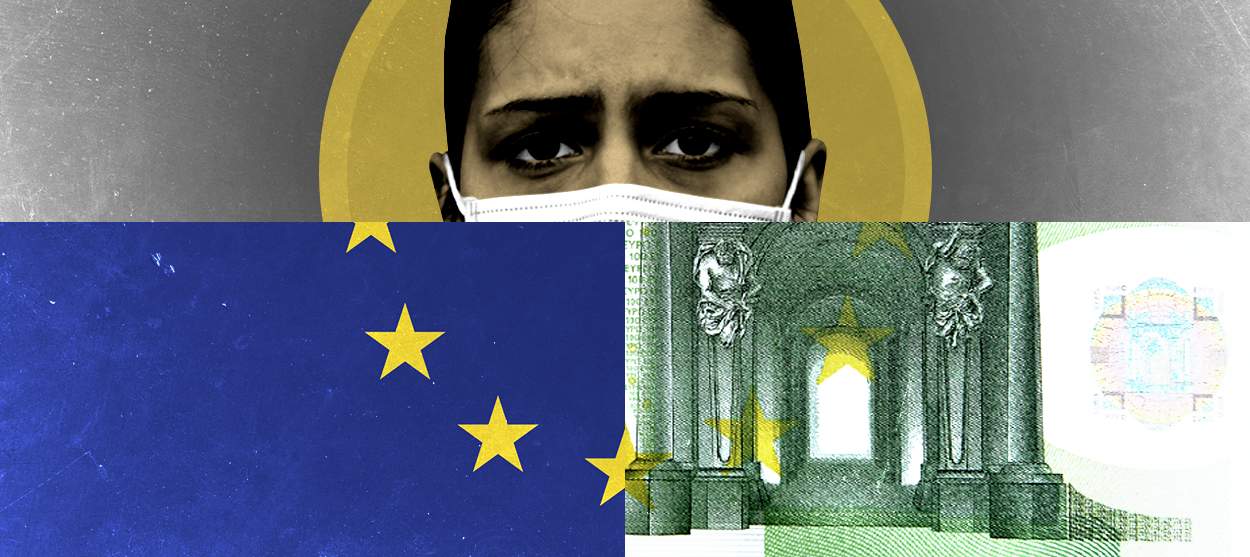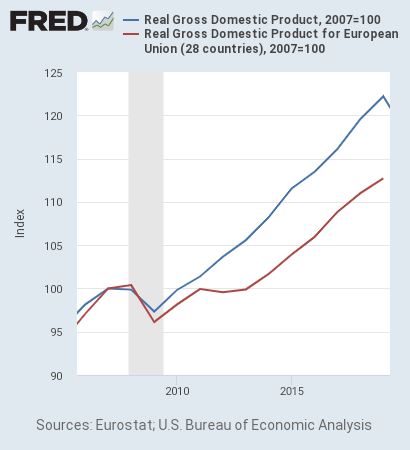Europe is back in recession. It's not just the virus.
The E.U. never recovered from the Great Recession


A free daily email with the biggest news stories of the day – and the best features from TheWeek.com
You are now subscribed
Your newsletter sign-up was successful
Europe is in the unaccustomed position of being roundly whipped by the United States at a public health effort. Thanks apparently to bureaucratic disasters and widespread anti-vaccine paranoia, the coronavirus vaccine rollout there is going much more slowly than here — the share of Americans with at least one vaccine shot is 60 percent greater than in Germany, and twice the figure in France (admittedly contrary to my own expectations).
As a result, many E.U. countries have been forced back into partial lockdowns, and the region's economy is suffering. Whereas America saw powerful economic growth in the first quarter of this year, the E.U. actually shrank slightly and is now technically in recession once more.
The European vaccine rollout does seem to be accelerating finally after the slow start, and E.U. authorities have planned some programs to goose their economy. But it's critical to realize that even before the pandemic hit, the E.U. had profound economic problems — it basically never got even close to recovering from the Great Recession. What it needs (as soon as vaccination is completed) is continuing mega-stimulus to restore full employment and prosperity across the continent.
The Week
Escape your echo chamber. Get the facts behind the news, plus analysis from multiple perspectives.

Sign up for The Week's Free Newsletters
From our morning news briefing to a weekly Good News Newsletter, get the best of The Week delivered directly to your inbox.
From our morning news briefing to a weekly Good News Newsletter, get the best of The Week delivered directly to your inbox.
I have previously written on how the botched response to the Great Recession created an economic lost decade in the United States. In 2019, American economic output was roughly 15 percent below the previous 1947-2007 trend — lost potential greater than the economies of California and Virginia put together.
But the E.U. has done even worse. Here is a chart comparing the inflation-adjusted GDP of the E.U. (red line) and U.S. (blue line) up to the pandemic, with the 2007 figure normalized to 100 for ease of comparison. The American performance has been nearly twice as strong:

(Courtesy St. Louis Federal Reserve Bank)
So while America struggled to get out of the Great Recession sandpit, the E.U. essentially never left.
A free daily email with the biggest news stories of the day – and the best features from TheWeek.com
The reason is a decade-long binge of austerity, particularly in the countries that use the euro. After the Great Recession, eurozone elites decided to scapegoat countries like Spain and especially Greece for the ensuing debt crisis. Beforehand, French and German banks had cavalierly invested in the debts of the eurozone's peripheral countries with little regard for how they might be repaid (and did the same thing with American mortgage-backed assets). When the crisis struck, Greece and Spain fell into recession, and the debts could not be serviced. So eurozone elites bailed out French and German banks by "lending" money to Spain and Greece that was used to pay off their private creditors, and then camouflaged what they were doing by pretending the whole thing was solely the fault of profligate Spaniards and Greeks (thus deflecting blame from bankers who made irresponsible loans), and requiring harsh austerity as punishment.
As a result, the eurozone periphery suffered a Great Depression-scale calamity. Unemployment in Greece soared to 28 percent, and in Spain to 26 percent. Neither of those countries have since gotten within shouting distance of full employment — in 2019, unemployment rates were 17 and 14 percent respectively. And because the austerity wrecked the Greek and Spanish economies, the actual burden of debt (measured by the debt-to-GDP ratio) saw virtually no improvement. Even in France and Germany, economic performance has been weak since 2008, with relatively low unemployment but slow growth.
What Europe needs today is the same thing it has needed for the last 13 years: a massive dose of economic stimulus to restore full employment and production. It is a criminal waste of human potential to allow mass unemployment to fester year after year. It is also politically toxic — it's not a coincidence that far-right parties have been gaining support across the continent. More spending in Germany in particular (wages there have been stagnant for decades) would help redress that country's massive and toxic trade surplus, which exacerbates the American trade deficit and is one reason why Germany's infrastructure is in such poor shape. Perhaps Germans might even take some solidarity vacations to Greece!
In the U.S., it seems that the pandemic might just have broken through the austerity mindset. Democrats passed a $1.9 trillion rescue bill, and President Biden has proposed over $4 trillion in additional reform packages. If all that passes, America might just leap to true full employment and start healing the economic scars of the last decade.
There are signs of a rethink in Europe too. The pandemic forced E.U. authorities to suspend budgetary rules and pass a huge economic rescue package to prevent disaster, and in December they agreed to a further 1.8 trillion-euro stimulus. But that is still far short of what the U.S. has spent in total, and probably not enough to fix the long-term damage since 2008. Worse, there are rumblings that Germany is already considering pressuring Spain back into austerity in the next year or two. If the E.U. doesn't keep its foot on the economic accelerator until full employment is reached, it will remain mired in economic stagnation.
Ryan Cooper is a national correspondent at TheWeek.com. His work has appeared in the Washington Monthly, The New Republic, and the Washington Post.
-
 Local elections 2026: where are they and who is expected to win?
Local elections 2026: where are they and who is expected to win?The Explainer Labour is braced for heavy losses and U-turn on postponing some council elections hasn’t helped the party’s prospects
-
 6 of the world’s most accessible destinations
6 of the world’s most accessible destinationsThe Week Recommends Experience all of Berlin, Singapore and Sydney
-
 How the FCC’s ‘equal time’ rule works
How the FCC’s ‘equal time’ rule worksIn the Spotlight The law is at the heart of the Colbert-CBS conflict
-
 The billionaires’ wealth tax: a catastrophe for California?
The billionaires’ wealth tax: a catastrophe for California?Talking Point Peter Thiel and Larry Page preparing to change state residency
-
 Bari Weiss’ ‘60 Minutes’ scandal is about more than one report
Bari Weiss’ ‘60 Minutes’ scandal is about more than one reportIN THE SPOTLIGHT By blocking an approved segment on a controversial prison holding US deportees in El Salvador, the editor-in-chief of CBS News has become the main story
-
 Has Zohran Mamdani shown the Democrats how to win again?
Has Zohran Mamdani shown the Democrats how to win again?Today’s Big Question New York City mayoral election touted as victory for left-wing populists but moderate centrist wins elsewhere present more complex path for Democratic Party
-
 Millions turn out for anti-Trump ‘No Kings’ rallies
Millions turn out for anti-Trump ‘No Kings’ ralliesSpeed Read An estimated 7 million people participated, 2 million more than at the first ‘No Kings’ protest in June
-
 Ghislaine Maxwell: angling for a Trump pardon
Ghislaine Maxwell: angling for a Trump pardonTalking Point Convicted sex trafficker's testimony could shed new light on president's links to Jeffrey Epstein
-
 The last words and final moments of 40 presidents
The last words and final moments of 40 presidentsThe Explainer Some are eloquent quotes worthy of the holders of the highest office in the nation, and others... aren't
-
 The JFK files: the truth at last?
The JFK files: the truth at last?In The Spotlight More than 64,000 previously classified documents relating the 1963 assassination of John F. Kennedy have been released by the Trump administration
-
 'Seriously, not literally': how should the world take Donald Trump?
'Seriously, not literally': how should the world take Donald Trump?Today's big question White House rhetoric and reality look likely to become increasingly blurred
